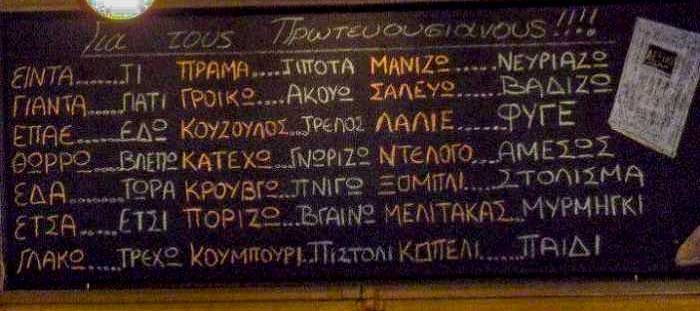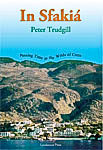
Sfakian Dialect
an article written exclusively for this site by Prof. Emeritus Peter Trudgill
Much fanciful nonsense has been written suggesting that the distinctiveness of the Sfakian dialect of Greek is due to the preservation in the region of 'pure' Dorian Greek as this was brought to Crete 3000 years ago. It is certainly true that the dialect of the Sfakia region is in a number of ways different from the other dialects of Crete. But the reality is that its distinctiveness is due to the relative isolation of the area in much more recent times.
The best known of all Cretan dialect features is that the consonants k, g, x (ch) and gh are pronounced like English ch, j, sh and zh before the vowels i and e. For example, ke 'and' is che, anagi 'need' is anaji, maxeri 'knife' is masheri, and Giorgho is Zhorgho. You may well hear these pronunciations in Chora Sfakion, but it is a feature which is absent from many of the villages of the Sfakia region.
The most recognisable Sfakian feature, however, concerns the pronunciation of L. Before the vowels i and e this is pronounced more or less as in other varieties of Greek. Before the vowels a, o, and u, however, a very different sound occurs which is very similar indeed to the pronunciation of r in American English, so that kalá 'well' sounds like 'kará'. Interestingly, in the village of Chora Sfakion, this feature is now almost entirely confined to the speech of men.
Visitors to Sfakia who know some Greek may notice a number of words which are typical of the southern islands generally, or of Crete, or of western Crete, or of Sfakia itself. These include:
| Sfakian | English | Greek |
|---|---|---|
| inda? | what? | = ti? |
| jada? | why? | = jatí? |
| etsá | thus | = étsi |
| edhá | now | = tóra |
| epá | here | = edhó |
| ekiá | over there | = ekí péra |
| práma | nothing | =típota |
| kopéli | boy | = aghóri |
| kopélia | boys | |
| kopeliá | girl | = korítsi |
| kopeliés | girls | |
| trozós | crazy | = trellós |
| opsés | yesterday | = xtes |
| ghlakó | I run | = tréxo |
| katéo | I know | = kséro |
| thoró | I see | = vlépo |
A number of words have a rather different pronunciation from those you might have learned in phrase books:
| Sfakian | English | Greek |
|---|---|---|
| oi | no | = óxi |
| áne | if | = án |
| oúla | everything | = óla |
| ókso | outside | = ékso |
| mikiós | small | = mikrós |
| pothéno | I die | = pethéno |
| símero | today | = símera |
There are some grammatical differences also. Past tense verb forms tend to have the e- prefix in all forms:
| Sfakian | English | Greek |
|---|---|---|
| edhoúlepsa | I worked | = dhoúlepsa |
And it is possible to place a pronoun object after the verb rather than before it:
| Sfakian | English | Greek |
|---|---|---|
| thoró se | I see you | = se vlépo |
All the Sfakia people who come into contact with tourists can switch very easily between Sfakian dialect and Standard Greek, as well as English and maybe German and French too. They remain, however, very proud of their local dialect.
Peter Trudgill
Peter Trudgill is Professor of English Language and Linguistics at the University of Fribourg, Switzerland. He is the author of several books on dialect and on language and society.
Special interests: Dialectology
Besides he is a long time visitor of the region of Sfakia/ Crete and of Chora Sfakion in particular. "If you want to mention I have been to Sfakia more than 450 times, that's OK! I wish ....................."
A small part of his bibliography:
- • Sociolinguistics: an introduction. 1974
- • Accent, Dialect and the School. 1975
- • Dialects in Contact. 1986
- • Bad Language, with Lars Andersson. 1990
- • The Dialects of England. 1990
- • Introducing Language and Society. 1992
- • Dialects. 1994
- • Language Myths, with Laurie Bauer. 1998
- • In Sfakiá: passing time in the wilds of Crete, 2008









